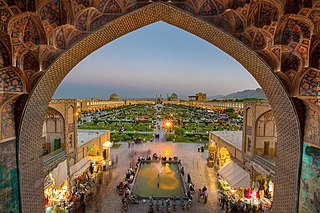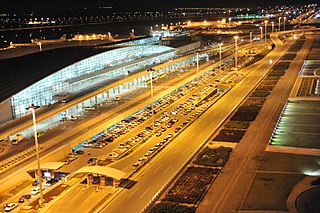
Iran, also known as Persia and officially the Islamic Republic of Iran (IRI), is a country in West Asia. It is bordered by Iraq to the west and Turkey to the northwest, Azerbaijan, Armenia, the Caspian Sea and Turkmenistan to the north, Afghanistan to the east, Pakistan to the southeast, the Gulf of Oman & the Persian Gulf to the south. With almost 90 million people in an area of 1.648 million square kilometres, Iran ranks 17th in the world in both geographic size and population. The country is divided into five regions with 31 provinces. The nation's capital and most populous city is Tehran, with around 16 million people in its metropolitan area, other major urban centres include Mashhad, Isfahan, Karaj, and Shiraz.

Kabaddi is a contact team sport played between two teams of seven players, originating in ancient India. The objective of the game is for a single player on offence, referred to as a "raider", to run into the opposing team's half of the court, touch out as many of their players as possible, and return to their own half of the court, all without being tackled by the defenders in 30 seconds. Points are scored for each player tagged by the raider, while the opposing team earns a point for stopping the raider. Players are taken out of the game if they are touched or tackled, but return to the game after each point scored by their team from a tag or tackle.

Zoroastrianism, also known as Mazdayasna and Behdin, is an Iranian religion. One of the world's oldest organized faiths, it is based on the teachings of the Avesta and the Iranian prophet Zoroaster. It has a dualistic cosmology of good and evil within the framework of a monotheistic-style ontology; meaning that the religion's eschatology predicts the ultimate triumph of good over evil. Zoroastrians exalt an uncreated and benevolent deity of wisdom, commonly referred to as "Ahura Mazda", as the universe's supreme being; opposed to Ahura Mazda is "Angra Mainyu", who is personified as a destructive spirit and the adversary of all things good. Historically, the unique features of Zoroastrianism, such as monotheism, messianism, belief in free will and judgement after death, conception of heaven, hell, angels, and demons, among other concepts, may have influenced other religious and philosophical systems, including the Abrahamic religions and Gnosticism, Northern Buddhism, and Greek philosophy.

Benjamin "Bibi" Netanyahu is an Israeli politician who has been serving as the prime minister of Israel since 2022, having previously held the office from 1996 to 1999 and again from 2009 to 2021. He is the chairman of the Likud party. Netanyahu is the longest-serving prime minister in the country's history, having served for a total of over 16 years. He is also the first prime minister to have been born in Israel after its establishment.

Geography is an important factor in informing Iran's foreign policy. Following the 1979 Iranian Revolution, the newly formed Islamic Republic, under the leadership of Ayatollah Khomeini, dramatically reversed the pro-American foreign policy of the last Shah of Iran Mohammad Reza Pahlavi. Since then the country's policies have oscillated between the two opposing tendencies of revolutionary ardour to eliminate Western and non-Muslim influences while promoting the Islamic revolution abroad, and pragmatism, which would advance economic development and normalization of relations. Iran's bilateral dealings are accordingly sometimes confused and contradictory.

Isfahan is a major city in the Central District of Isfahan County, Isfahan province, Iran. It is the capital of the province, the county, and the district. It is located 440 kilometres south of Tehran. The city has a population of approximately 2,220,000, making it the third-most populous city in Iran, after Tehran and Mashhad, and the second-largest metropolitan area.

The Iranian Revolution, also known as the Islamic Revolution, was a series of events that culminated in the overthrow of the Pahlavi dynasty in 1979. The revolution also led to the replacement of the Imperial State of Iran by the present-day Islamic Republic of Iran, as the monarchical government of Mohammad Reza Pahlavi was superseded by the theocratic government of Ayatollah Ruhollah Khomeini, a religious cleric who had headed one of the rebel factions. The ousting of Pahlavi, the last Shah of Iran, formally marked the end of Iran's historical monarchy.

Sistan and Baluchestan province or Asli Baluchestan is the second largest province of the 31 provinces of Iran, after Kerman province, with an area of 180,726 km2. It is in the southeast of the country, bordering Afghanistan and Pakistan, and its capital is the city of Zahedan.

Imam Khomeini International Airport is the primary international airport of Tehran, the capital city of Iran, located 30 kilometres (19 mi) south of Tehran. All international flights in Tehran are currently served by this airport, and all domestic flights are served by Mehrabad Airport. IKA ranks third in terms of total passenger traffic in Iran after Mehrabad Airport and Mashhad International Airport. The airport is operated by the Iran Airports Company and is the primary operating base for Iran Air and Mahan Air, as well as an international hub for many smaller Iranian airlines.

The Islamic Revolutionary Guard Corps, also called Sepah or Pasdaran, is a multi-service primary branch of the Iranian Armed Forces. It was officially established by Ruhollah Khomeini as a military branch in May 1979, in the aftermath of the Iranian Revolution. Whereas the Iranian Army protects the country's sovereignty in a traditional capacity, the IRGC's constitutional mandate is to ensure the integrity of the Islamic Republic. Most interpretations of this mandate assert that it entrusts the IRGC with preventing foreign interference in Iran, thwarting coups by the traditional military, and crushing "deviant movements" that harm the ideological legacy of the Islamic Revolution. Currently, the IRGC is designated as a terrorist organization by Bahrain, Saudi Arabia, Sweden and the United States.

The Quds Force is one of five branches of Iran's Islamic Revolutionary Guard Corps (IRGC) specializing in unconventional warfare and military intelligence operations. U.S. Army's Iraq War General Stanley McChrystal describes the Quds Force as an organization analogous to a combination of the CIA and the Joint Special Operations Command (JSOC) in the United States. Responsible for extraterritorial operations, the Quds Force supports non-state actors in many countries, including Hezbollah, Hamas, Palestinian Islamic Jihad, Yemeni Houthis, and Shia militias in Iraq, Syria, and Afghanistan. According to Michael Wigginton and others, the Al-Quds Force is "a classic example of state-sponsored terrorism."
Since the Iranian Revolution in 1979, the government of the Islamic Republic of Iran has been accused by several countries of training, financing, and providing weapons and safe havens for non-state militant actors, such as Hezbollah in Lebanon, Hamas in Gaza, and other Palestinian groups such as the Islamic Jihad (IJ) and the Popular Front for the Liberation of Palestine (PFLP). These groups are designated terrorist groups by a number of countries and international bodies such as the EU, UN, and NATO; however, Iran considers such groups to be "national liberation movements" with a right to self-defense against Israeli military occupation. These proxies are used by Iran across the Middle East and Europe to foment instability, expand the scope of the Islamic Revolution, and carry out terrorist attacks against Western targets in the regions. Its special operations unit, the Quds Force, is known to provide arms, training, and financial support to militias and political movements across the Middle East, including Bahrain, Iraq, Lebanon, Palestine, Syria, and Yemen.

The Iranian Armed Forces, officially the Islamic Republic of Iran Armed Forces, are the combined military forces of Iran, comprising the Islamic Republic of Iran Army (Artesh), the Islamic Revolutionary Guard Corps (Sepah) and the Law Enforcement Force (Faraja).

The Houthi movement, officially known as Ansar Allah, is a Shia Islamist political and military organization that emerged from Yemen in the 1990s. It is predominantly made up of Zaidi Shias, with their namesake leadership being drawn largely from the Houthi tribe.
Beyranvand-e Shomali Rural District is in Beyranvand District of Khorramabad County, Lorestan province, Iran. Its capital is the village of Bid Hal, transferred from Khar Eshgaft.
The Axis of Resistance is an informal Iranian-led political and military coalition in West Asia and North Africa. It most notably includes the Syrian government, the Lebanese political party and militant group Hezbollah, the Yemeni political and military organization Ansar Allah, and a variety of Palestinian militant groups.

The Iran–Israel proxy conflict, also known as the Iran–Israel proxy war or Iran–Israel Cold War, is an ongoing proxy conflict between Iran and Israel. In the Israeli–Lebanese conflict, Iran has supported Lebanese Shia militias, most notably Hezbollah. In the Israeli-Palestinian conflict, Iran has backed Palestinian groups such as Hamas. Israel has supported Iranian rebels, such as the People's Mujahedin of Iran, conducted airstrikes against Iranian allies in Syria and assassinated Iranian nuclear scientists. In 2018 Israeli forces directly attacked Iranian forces in Syria.
Sepidar Rural District is in Sepidar District of Boyer-Ahmad County, Kohgiluyeh and Boyer-Ahmad province, Iran. Its capital is the village of Pazanan.
Pazanan is a village in, and the capital of, Sepidar Rural District of Sepidar District, Boyer-Ahmad County, Kohgiluyeh and Boyer-Ahmad province, Iran.

The Joint Comprehensive Plan of Action, commonly known as the Iran nuclear deal or Iran deal, is an agreement on the Iranian nuclear program reached in Vienna on July 14, 2015, between Iran and the P5+1 together with the European Union.















